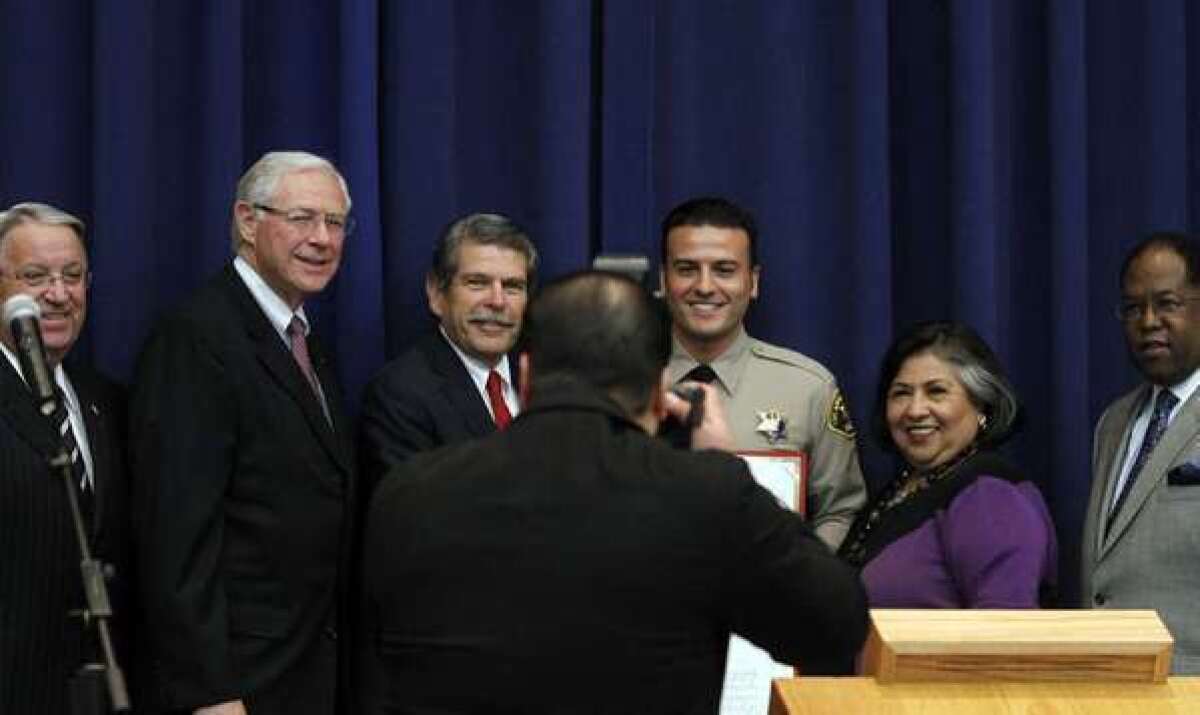L.A.’s supervisors are still breaking the law

- Share via
Our editorial page counterparts at the Daily News and its sibling publications around the county took off after the Los Angeles County Board of Supervisors on Sunday for trying to change the law to make it OK for them to have closed-door meetings with the governor, like the three sessions that got the supes in trouble back in 2011.
Good on you, Daily News folks. Let ’em have it. And good on the editorial pages at other California newspapers like the Desert Sun (Palm Springs, Coachella Valley) that are likewise unhappy with a silly time-waster of a bill, now on the governor’s desk, by Democrat Steven Bradford of Inglewood.
We say the same thing – just about – in Monday’s Times editorial pages. For background and our previous scoldings arising out of these incidents, read here, here and here.
Our take today is a shade different from the Daily News’, though. They say, “The secret meeting was bogus and so is this legislation that would make it legal.” We’re with them until the very last part of that sentence. Bogus meeting and bogus legislation, yes. But Bradford’s wayward bill still wouldn’t make it legal for the board to have meetings like those (two on the phone, one in person) it had with Gov. Jerry Brown nearly two years ago to discuss AB 109 public safety realignment.
The exception that the board keeps relying on – threats to public facilities or services – simply doesn’t cut it when there is no actual, imminent threat. The excuse dreamed up at the time by the board’s lawyer – that there was a threat to the inmates’ access to services because the state wasn’t giving the county enough money – is laughable.
The exception (Government Code Section 54957[a]) is in the law in case of a 9/11 kind of emergency, so that the bad guys don’t get to listen in on the planned emergency response to their actions. It’s not there for policy discussions or arguments about funding. Even the governor ridiculed the pretense when he was in the actual closed meeting, as transcripts show.
The legal term is chutzpah: Pretending there is a threat against public access, and using that supposed threat as a justification to block public access.
The supervisors are still doing this, you know. Every single week. No, not having improper closed sessions (at least as far as we know), but improperly relying on the public services/facilities exception to have a standing placeholder item on every agenda purporting to schedule a “continued” conference with the sheriff to discuss “threats to public services or buildings” – even when there are no such threats and no such discussion is planned. See, for example, item A-2 on this week’s agenda, citing the same Brown Act exception. It was there last week, too. It will be there next week. And the week after that.
They can’t do that, any more than they could have a weekly item about closed sessions to discuss threatened litigation even when there is no such threat pending and there is no discussion planned. It would be redundant to ever put any item on the agenda at all if the notice requirement could be legally accomplished by weekly boilerplate. If everything is on the agenda, whether or not it is ever discussed, nothing is on the agenda. Standing items don’t notify the public of important discussions; they’re attempted justifications for “pop-up” discussions, and they do the opposite.
The board is still breaking the law. Bradford’s bill won’t change that.
ALSO:
The Brown Act means what it says
Get rid of those outdated HIV laws
Brave new world of government surveillance
More to Read
A cure for the common opinion
Get thought-provoking perspectives with our weekly newsletter.
You may occasionally receive promotional content from the Los Angeles Times.







